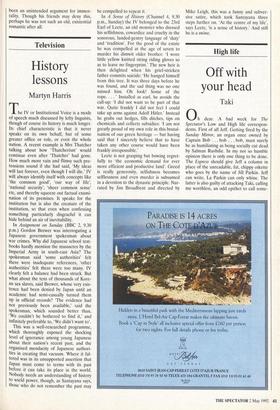Television
History lessons
Martyn Harris
The IV or Institutional Voice is a mode of speech much discussed by lefty linguists, though of course its history is much longer.
Its chief characteristic is that it never speaks on its own behalf, but of some greater office or role, or even the whole nation. A recent example is Mrs Thatcher talking about how `Thatcherism' would continue even after 'Thatcher' had gone.
How much more vain and flimsy such pre- tensions sound if she had said, 'My ideas will last forever, even though I will die.' IV will always identify itself with concepts like `the common good', 'our way of life', `national security', 'sheer common sense' etc, and thereby squeeze out factual exami- nation of its premises. It speaks for the institution but is also the creature of the
institution, so that even when confessing something particularly disgracful it can hide behind an air of inevitability.
In Assignment on Sunday (BBC 2, 9.30 p.m.) Gordon Brewer was interrogating a Japanese government spokesman about war crimes. Why did Japanese school text
books hardly mention the massacres by the Imperial Army in south-east Asia? The spokesman said 'some authorities' felt there were inadequate references, 'other authorities' felt there were too many. IV clearly felt a balance had been struck. But what about the tens of thousands of Kore- an sex slaves, said Brewer, whose very exis- tence had been denied by Japan until an academic had semi-casually turned them up in official records? The evidence had not previously been available,' said the spokesman, which sounded better than, `We couldn't be bothered to find it,' and infinitely preferable to, 'We didn't want to' This was a well-researched programme, which thoroughly exposed the shocking level of ignorance among young Japanese about their nation's recent past, and the organised mendacity of Japanese authori- ties in creating that vacuum. Where it fal- tered was in its unsupported assertion that
Japan must come to terms with its past before it can take its place in the world.
Nobody needs an understanding of history to wield power, though, as Santayana says, those who do not remember •the past may be compelled to repeat it.
In A Sense of History (Channel 4, 9.30 p.m., Sunday) the IV belonged to the 23rd Earl of Leete, an old monster who dressed his selfishness, cowardice and cruelty in the sonorous, landed-gentry language of 'duty' and 'tradition'. For the good of the estate he was compelled at the age of seven to murder his dimwit older brother: 'I wore little yellow knitted string riding gloves so as to leave no fingerprint.' The new heir is then delighted when his grief-stricken father commits suicide: 'He hanged himself from this tree. It was three days before he was found, and the sad thing was no one missed him. Oh look! Some of the rope.. . . ' Installed as earl, he avoids the call-up: 'I did not want to be part of that war. Quite frankly I did not feel I could take up arms against Adolf Hitler.' Instead he grubs out hedges, fills ditches, tips on chemicals and collects subsidies: 'I am not greatly proud of my own role in this brutal- isation of our green heritage — but having said that I sincerely believe that to have taken any other course would have been frankly irresponsible.'
Leete is not grasping but bowing regret- fully to 'the economic demand for ever more efficient and productive land'. Greed is really generosity, selfishness becomes selflessness and even murder is subsumed in a devotion to the dynastic principle. Nar- rated by Jim Broadbent and directed by Mike Leigh, this was a funny and subver- sive satire, which took Santayana three steps further on. 'At the centre of my life', says Leete, 'is a sense of history.' And still he is a swine.


















































 Previous page
Previous page